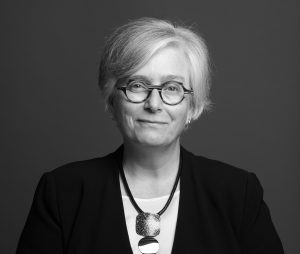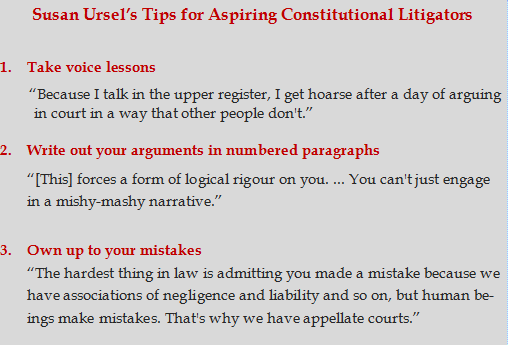
By Sara Tatelman
When you walk into the waiting room at labour law firm Ursel Phillips Fellows Hopkinson LLP, you’re greeted by large black-and-white photographs of Canadians at work and, in silver sans-serif type mounted on the back wall, an unattributed quote: “The philosophers have only interpreted the world. The point is to change it.”
As we sit down, senior partner Susan Ursel readily tells me the photographs were taken by Toronto documentarian Vincenzo Pietropaolo, and the quote is from Karl Marx. “[Partner] Gary Hopkinson is our resident philosopher … and he came up with that one,” she says. “It seems so apt because we don’t want to just study the world — we are actually here to contribute to it.”
Ursel, who will serve as the Asper Centre’s Constitutional Litigator-in-Residence for the 2018-19 year, has tried to change the world since she was in high school. “I used to picket my local Dominion store and ask people not to buy grapes and to support Cesar Chavez and the United Farm Workers in their struggle for recognition,” she says. “… I could see how difficult it was for some people to make their own way, to be successful, and we see it even more today. And I just thought, that’s a kind of work that I can see applying myself to … and feeling that I’m adding something to the world. And that became my pole star and what I followed all the way through undergrad and then law school.”
Throughout her career, Ursel has represented a wide variety of unions and individuals on labour, employment and human rights issues. Recently, she intervened for the Canadian Bar Association in Trinity Western University v. The Law Society of Upper Canada. “I think it’s problematic to view any rights in an absolutist way, and I think we have to be very careful about the concept of religious freedom,” she says. “… We’ve prided ourselves on being welcoming to everyone, and when an institution asks to be recognized in the public square, which is what Trinity Western is asking, … [it must] engage with everybody.”
Ursel’s long history of advocating for LGBTQ+ rights — including in Egan, which confirmed sexual orientation as a prohibited ground of discrimination under the Charter, and in XY, which established it’s discriminatory to require trans folks to have sex reassignment surgery before they can change their sex designation on their birth certificates — stems from her own experience as a lesbian lawyer who came out in the 1980s.
“There weren’t a lot of us,” she says. “And the ones who were out in the legal profession belonged to something called the Other Lawyers Association. We didn’t have email. We had telephone trees and letters in brown paper wrappers with no identifying marks on the outside to invite each other to parties.”
One year, Ursel hosted a Christmas party for other LGBTQ+ lawyers. “I couldn’t get the guys to leave!” she remembers, laughing. “They were so happy. … There was no place to go and be themselves and talk amongst their peers and they were having just a really wonderful time. I remember thinking, ‘They’re not going home. I’m going to find some of them on the living room floor tomorrow morning.’”

At the Asper Centre this fall, Ursel will co-teach the constitutional litigation clinic. This typically involves intervening on a Charter case at the Supreme Court, and preparing an advocacy brief on another constitutional issue.
Ursel is especially keen to meet and mentor students. When she was in law school at Osgoode Hall, she took a constitutional litigation course that was “absolutely formative” for her career. While the professor was more conservative than Ursel, she gave very specific feedback on students’ ideas and arguments, and wasn’t stingy with praise.
“That kind of affirmation from somebody with a different viewpoint than you has so much power,” Ursel says. “So I know I’m going to meet people from all walks of life in this program, with all different viewpoints, but I’m hoping I can give them something of what [my professor] gave to me. Even if I don’t see it exactly the same way as you, I will tell you when you’re doing a good job. I will tell you what I think you can do better. I will engage with you on tough issues and talk about them because I care passionately about them and I want the next generation to care passionately too, and to engage in the kind of civil debate we have in this country.”
Sara Tatelman is the Asper Centre’s 2018 summer research assistant.
